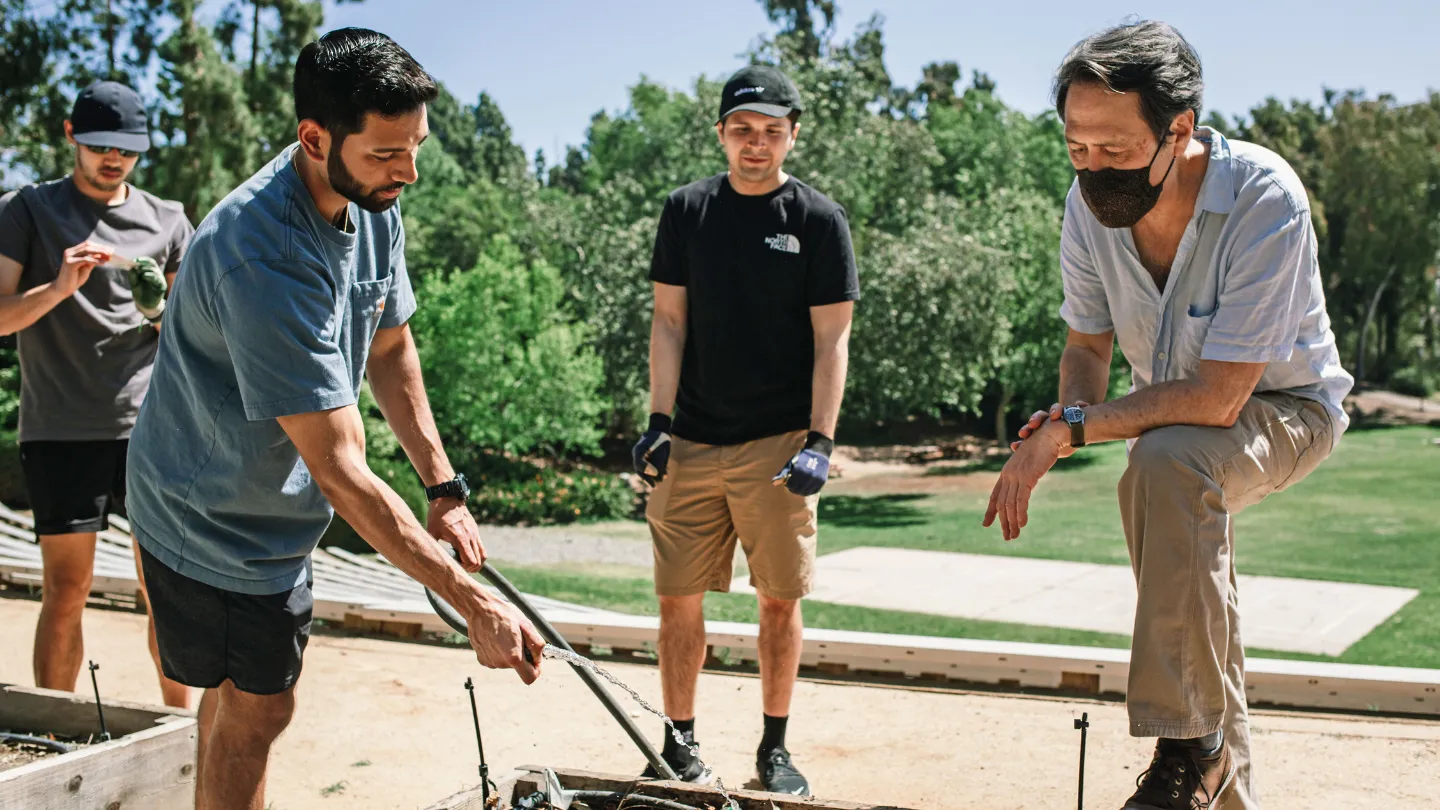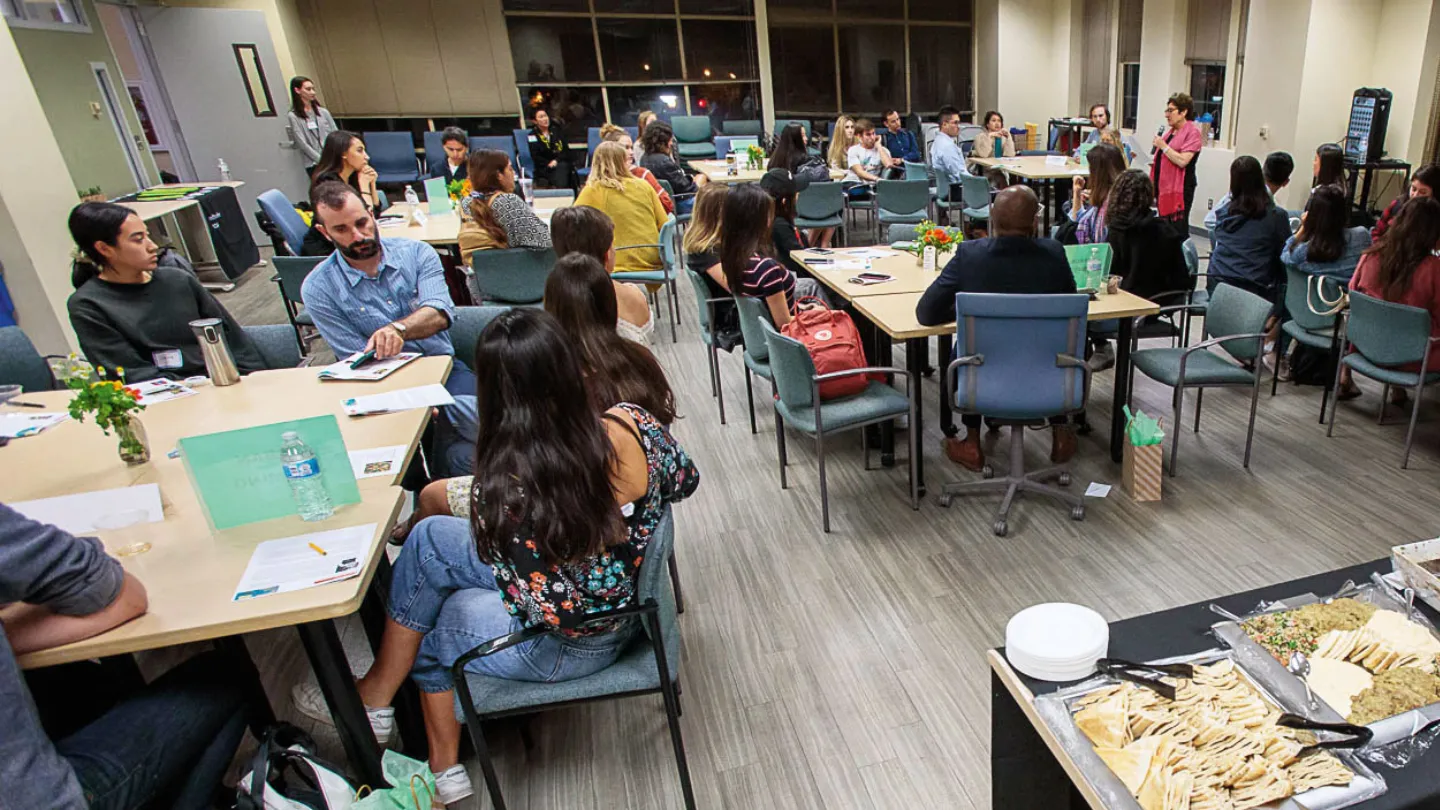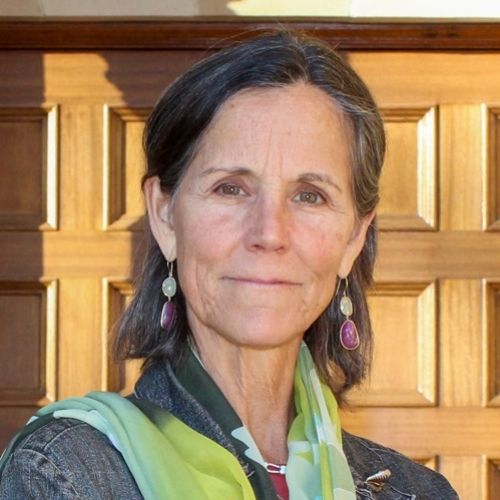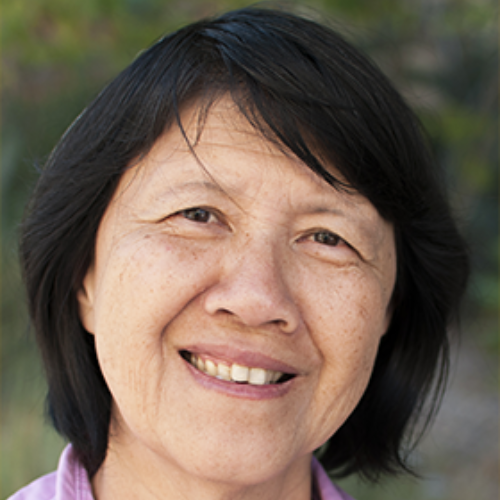
Common Ground
In the UCLA Fielding School’s Food Studies Graduate Certificate Program and a course on urban agriculture, students from wide-ranging disciplines come together for holistic education with the goals of food equity and sustainability.

SARAH FANTA LOVED HER JOB AS A DIETITIAN with the Public Health Foundation Enterprises WIC program, which provides healthy free food, nutrition education, breastfeeding assistance, and family resources to more than 200,000 women, children, and families in Southern California. As a supervisor at WIC offices in South Los Angeles and Culver City, Fanta managed teams that provided support services as well as high-risk counseling to WIC participants. But as much as she enjoyed assisting some of the region’s most vulnerable residents, after more than seven years at the agency, Fanta decided to seek graduate education that could provide a broader perspective on the food-insecurity challenges and disparities she encountered on a daily basis. Fanta put her administrative duties on hold and, while continuing as a WIC dietitian, enrolled in the UCLA Fielding School of Public Health’s MPH program.
While she was pursuing her MPH, Fanta also began taking courses in the Food Studies Graduate Certificate Program, based in UCLA Fielding’s Department of Community Health Sciences but open to all UCLA graduate students. The program prepares students from wide-ranging disciplines to address complex topics related to food cultures and histories, nutrition and public health, food policy and food justice, and urban planning and environmental sustainability.
“My exposure to food and nutrition issues beyond maternal and child populations had been quite limited, given that I’ve been at WIC for the majority of my post-undergraduate career,” Fanta says. “Learning about the complexities of the food system from faculty and other students who have such different perspectives has been amazing. It’s important to understand these complexities and work with other disciplines to make food more affordable, our practices more sustainable, and to ensure that the system is equitable for all populations.”
The development of the UCLA Food Studies Graduate Certificate Program, as well as other initiatives promoting interdisciplinary collaboration toward the goal of food equity and sustainability, came out of a Food Summit held at UCLA in 2014, led by the Semel Healthy Campus Initiative (HCI) Center. At the event, more than 70 faculty, students, staff, and campus leaders brainstormed on the development of experiential and co-curricular programs to educate students on the broad topics involved.
“Education focused on a specific subject is necessary, but students also need to develop the skills to work as part of interdisciplinary teams in order to address the whole food system,” explains Dr. Wendelin Slusser, associate vice provost of the Semel HCI Center, which was envisioned and supported by Jane and Terry Semel. “The interdisciplinary team approach integrates different disciplines, points of view, strengths, knowledge, goals, and values, and encourages experts from different fields to talk to one another. Building communication is the first step in solving the world’s biggest challenges.”
“Our goal is to educate and empower the next generation of interdisciplinary leaders and game changers to address the major issues of our time around food — and that means covering all of the dimensions of food in the global and local communities through the lens of equity.”— Dr. Wendelin Slusser
In the ensuing years, outcomes from the Food Summit have included the establishment of an undergraduate minor in food studies; the jane b semel Healthy Campus Initiative Community Garden, which provides an on-campus site for the UCLA community to grow healthy food and foster education on urban gardening practices, and donates a portion of the produce grown to help food-insecure students; and the Teaching Kitchen, a program of the Semel HCI Center, co-founded by FSPH, which offers an interactive space to help students learn to cook healthy and affordable meals. In January 2022, an anonymous $13.5 million gift established the UCLA Rothman Family Institute for Food Studies, an interdisciplinary institute devoted to research, teaching, and policy about food.

The Food Studies Graduate Certificate Program, established in 2015 and based in UCLA Fielding since 2019, represents the realization of the summit’s vision of an interdisciplinary approach to educating future leaders equipped to tackle the growing concerns of food security and environmental sustainability. Through the program, graduate students interested in food from different perspectives — health, economic, cultural, environmental, culinary — take classes together and collaborate on projects with others from across campus, including students from public health, urban planning, public policy, business, law, engineering, psychology, humanities, education, and other natural and social sciences.

"Healthy Food Access in Los Angeles: The History and Practice of Urban Agriculture," taught by James Bassett, a UCLA Fielding lecturer in Community Health Sciences, combines hands-on gardening lessons with education on public health benefits.
The program is directed by a steering committee of five UCLA faculty: Dr. May Wang, FSPH professor of community health sciences and the program’s faculty lead; Slusser, who in addition to her role as associate vice provost is a professor in the UCLA Fielding School of Public Health and the David Geffen School of Medicine at UCLA; Dr. Robin Derby, an associate professor of history; Dr. Michael Roberts, professor and executive director of UCLA’s Resnick Center for Food Law and Policy; and Dr. A. Janet Tomiyama, an associate professor of psychology. All students are required to take the Food Studies Graduate Certificate Colloquium, which covers current issues in food studies, as well as at least three other courses from a variety of offerings in areas that include food policy and food systems, nutritional sciences, and the social and cultural aspects of food. The certificate program hosts events throughout the year that are open to the entire UCLA community.
Kyle Winterboer was admitted to multiple graduate programs in public policy, but decided on UCLA’s after learning about the food studies certificate program from a recent graduate. As part of the certificate program, Winterboer enrolled in the food law course taught by Roberts and wrote an extensive paper, based on experiences he saw his parents go through running their family farm in northwest Iowa, that critiqued corporate power in the food industry and its impact on food insecurity. From there, he took the colloquium course, taught by Wang, which helped him to more clearly see the public health effects of the policy issues he was studying. “That course got me to really think about the implications of food for community health, and the role of programs like SNAP [the Supplemental Nutrition Assistance Program],” Winterboer says.
Wang introduced Winterboer to unBox, a Stanford-based organization of students working to address food insecurity in the U.S. that Wang advises, and Winterboer began working with the group members as a volunteer, culminating in a speech they delivered at Yale Law School. He’s now studying food insecurity for his master’s thesis, working with the Los Angeles County Food Equity Roundtable, for which Wang serves on the advisory panel. Through the certificate program, Winterboer was connected with Prosperity Market, a Black-owned farmers market based in South Los Angeles, and began an internship with the business, which supports Black farmers and food entrepreneurs in efforts to bring more fresh produce to Black communities.
For Wang, who spearheaded the development of the certificate program, the opportunity to teach Winterboer and other students who come to food issues from all over the campus is itself an education. “We learn so much from these students bringing in their different perspectives, and the students learn from each other,” she says. “When we design interventions in public health, we have to consider so many factors beyond just health, and that requires communication across disciplines.”
It’s important to work with other disciplines to make food more affordable, our practices more sustainable, and to ensure that the system is equitable for all populations.
At the jane b semel Healthy Campus Initiative Community Garden at UCLA’s Sunset Canyon Recreation Center, students in a UCLA Fielding-taught course learn practical gardening techniques and have the opportunity to plant seeds and cultivate crops in the garden’s raised beds in half of the class sessions. “Healthy Food Access in Los Angeles: The History and Practice of Urban Agriculture,” taught by Dr. James Bassett, a UCLA Fielding lecturer in community health sciences, combines the hands-on gardening lessons with education on the public health benefits that can be reaped from urban agriculture. Among them, Bassett notes: making fresh produce more accessible and affordable to people in urban food deserts, promoting mental health and social connections through community gardens, and cultivating a taste and interest in fresh fruits and vegetables among young people in urban neighborhoods through school gardens. Students hear from leaders of grassroots groups such as Food Forward, which brings fresh surplus fruits and vegetables to people experiencing food insecurity in Southern California; and the UC Master Gardener Program, which trains master gardeners — including Bassett — to offer volunteer services and outreach to the public in more than 1,200 demonstration, community, and school gardens throughout California. All of the teachings about urban agriculture emphasize sustainable practices.

Students from wide-ranging disciplines on the UCLA campus come together to engage in discussions on food issues as part of the FSPH-based food studies graduate certificate program above: an event held by the program in February 2020.
Trish Lombardo, who took the course last winter, says she was initially enticed by the prospect of learning hands-on gardening practices. “Who wouldn’t want to gain some knowledge on a more farm-to-table lifestyle, or merely fulfill an urge of detaching by sticking your hands in some dirt?” she says. “But the class extends the basic ‘how-to’ knowledge on gardening to a deep awareness of the valuable practices of urban agriculture and its vital role in sustainability.”
Interest among students in the course is high, reflecting a societal resurgence in urban gardening that has been accelerated during the COVID-19 pandemic, Bassett says. He hopes the course instills an interest that students bring to their future professions, whatever they might be. “Obviously they’re not all going to go out there and establish small commercial urban farms to feed the world,” he says. “But I do imagine, because so many are going into fields such as public health, public policy, education, and psychology, that they might be working with others where they would be in a position to support or advocate for urban agriculture.”
Addy Hays, an undergraduate ecology major at UCLA with a minor in food studies, says the course has changed the way she views gardens. “I used to think of them as such an undertaking, but with the methods we learned, you just need a raised bed, 4-by-8 [feet], and you have yourself a mini-garden that can help to feed people,” she says. “Now, whenever I’m outside in a new environment and I see an open space, I think to myself, ‘How can we make this productive and beneficial to the community?’”
In her work as an intern at an elementary school garden in Los Angeles, Hays has seen the power of the experience for children, particularly in low-income communities. “They gain not just the physical benefits of consuming more fruits and vegetables, but also the therapeutic benefits of being in a garden space,” she says. “They get so excited to eat some- thing they’ve grown themselves, and they take that excitement home to their parents, which can influence their eating habits at an early age.”
Slusser views the holistic and equity-focused education of students in both the food studies certificate program and the urban agriculture course as a recipe for producing the leaders needed to ensure universal access to healthy, affordable foods. “Our goal is to educate and empower the next generation of interdisciplinary leaders and game changers to address the major issues of our time around food — and that means covering all of the dimensions of food in the global and local communities through the lens of equity,” she says.
Sarah Fanta intends to be among that group of leaders and game changers. She plans to continue her work at WIC while using her MPH for special projects addressing factors, such as housing, that affect the low-income population that participates in the WIC program. “I’ve learned that the food system is much more complex than I knew about, but that there are many exciting things happening,” she says. “Through a better understanding of the factors that affect food equity, my goal is to work with leaders in other fields to get more resources to our participants.”
ㅤ

